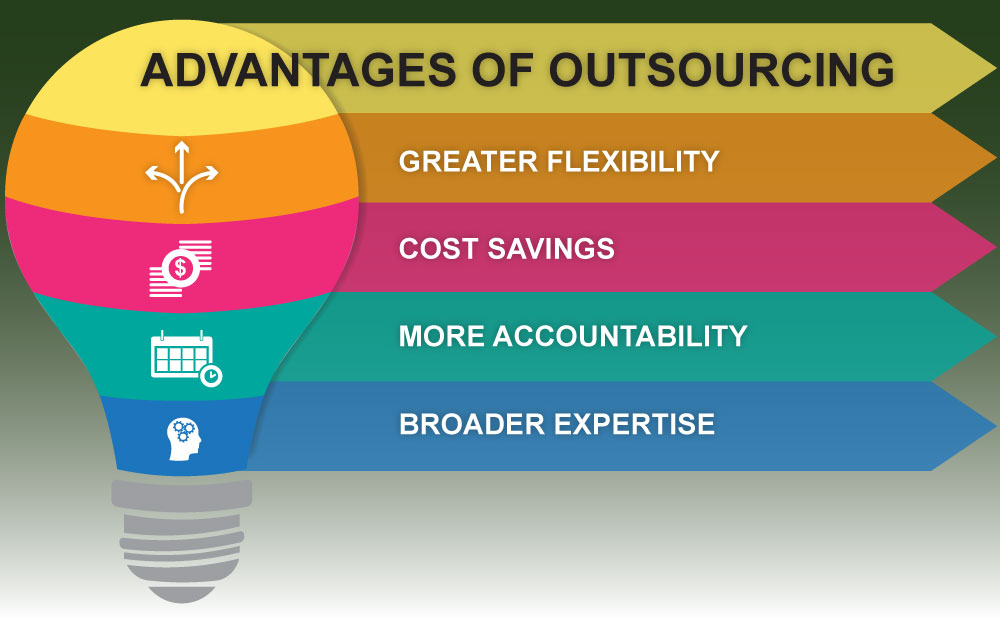8
2020
By Dan Pecchia

As the choppy recovery from COVID-19 continues, business leaders who prioritize marketing and public relations face a big decision as they rebuild: continue running those functions with full-time employees or consider a more flexible, cost-effective outsourcing model.
The advantages of using outside specialists for this critical work are significant in any season, but they’re huge during and after a pandemic. Here are four of those advantages.
Outside specialists can provide more flexibility
The primary benefit of securing outside help in any field, of course, is the flexibility that provides. Traditional employment is fraught with government regulations and costly conventions, including 40 hours of pay every week, a standard benefits package, office space, equipment, supplies and barriers to quickly parting company if things go south.
Organizations that use outside professionals can write contracts that meet their needs and sidestep the enormous cost and inconvenience of traditional employment situations.
During a pandemic, when it’s hard to tell if “normal” is a week away or years away, flexibility is a fast friend. Employment laws don’t provide flexibility (and weren’t intended to), but contracts can be as flexible as two business partners can agree to make them.
Outsourcing can reduce cost
Although organizations pay outside specialists much more per hour than they would pay their employees, they often pay much less in total cost. The true cost of employees includes the cost of fringe benefits, office space, supplies and the many other things in-house pros need to be effective, including staff to support them and managers to monitor and motivate them and administer their employment.
Moreover, since employees talented enough to deliver effective PR and marketing counsel aren’t likely to work part-time, organizations need to make full-time commitments, whether they truly need 40 hours of high-end counsel every week, all year long, or not.
In a carefully arranged outsourcing agreement, an organization can buy a much smaller number of hours with the flexibility to ramp up support if/when needed. Such agreements can save a bundle.
Hired guns have more incentive to be responsive and accountable
Communications agencies that land clients know that every day of billable hours brings them one day closer to their contractual relationship’s end, which is an opportunity to be replaced. So in addition to doing the required work, they need to go the extra mile to boost the likelihood that they’ll stay on.
That means there’s built-in pressure to be accountable, accessible and valuable.
That’s not to say employees can’t also be conscientious and motivated, as obviously they can. But employment is a long-term proposition and organizations usually don’t have the option to readily replace employees at will the way they can furlough their agencies. The degree of motivation and accountability, then, isn’t comparable.
Outsourcing can access broader expertise
Other than flexibility, the greatest benefit of going outside for communications and marketing help is expertise. Agencies work for multiple clients, and the good ones share internally about the expertise they pick up across varying industries and situations and over years and years.
They can bring their clients much broader experience than dedicated employees who haven’t been — and can’t be — as far around the block. Organizations that hire agencies have access to larger teams of accomplished pros, often in situations where they’re not on the clock.
Other issues to consider
There are, of course, downsides to relying heavily on outside pros. One is the risk of not building knowledge and expertise inside the company’s walls. Another is the risk of the agency leaving to work for a competitor. Still another — perhaps the worst — is having an agency that simply isn’t effective.
All of these could be mitigated to some extent with safeguards in contracts and/or day-to-day practices.
Even with these downsides, leaders rebuilding their organizations in the wake of COVID-19 need to consider the flexibility, cost savings, accountability and expertise they could gain in an ideal outsourcing arrangement with a strong, capable, trustworthy partner.
Dan Pecchia is an Ohio communications consultant and president of Pecchia Communications, which provides flexible, cost-effective and accountable expertise to organizations throughout the Mahoning Valley and beyond.
Latest Posts
- 3 Media Relations Guidelines for an Era of Growing Distrust May 5, 2025
- Brighten Up Your Brand: 3 Tips for a Summer Messaging Makeover May 5, 2025
- Pecchia Comm Lands 18th Major Change Engagement May 5, 2025
- Student Journalism Awards Lead Press Club’s Plans for 2025 March 6, 2025
- Pecchia Comm Plans $20K Grant to Celebrate 20th Anniversary February 26, 2025
- Power of Print Still Endures in Employee Comms February 5, 2025
- 6 Essential Communications Strategies for Managing Organizational Change February 4, 2025
- Factory Work Instructions Drive Compliance, Consistency February 3, 2025
6725 Pheasant Run Drive | Youngstown, Ohio 44406 | Privacy Policy

